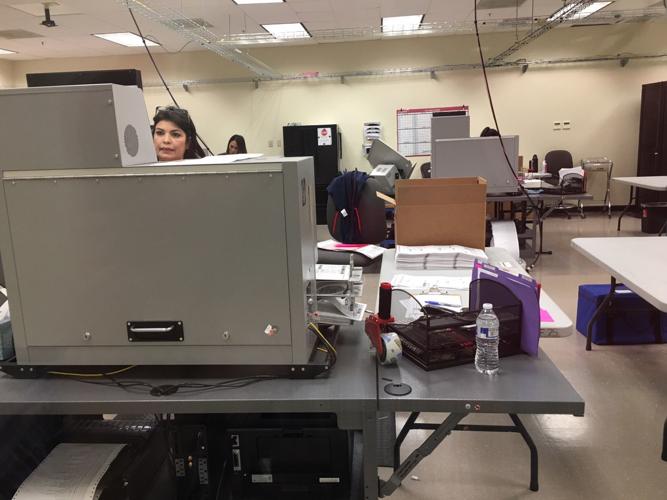We all may be anxious to know the final outcomes of the elections, but I’d argue we’re lucky for the delay.
It’s been a clarifying period.
Now we see clearly the downsides of our early-voting-based election systems, and we’re learning what to do to reduce the resulting delays, if we really want to.
We also are learning who believes in our democratic system, and who is willing to burn it down and unleash political chaos for an electoral win. That category includes some big political figures in Arizona.
The delays are not actually hard to explain and have become a routine part of our electoral process as the state has transitioned to early voting. People have only been noticing them more this year because an important race, the Martha McSally-Kyrsten Sinema contest for U.S. Senate, is hanging in the balance.
One problem is that mail-in ballots require a signature-check and other processing by the county recorders’ offices around the state before they can be counted. That’s not necessary when you vote at the polls, because your identification is verified when you sign in at the polling place.
Another problem is that many people turn in their early ballots at the polls on Election Day. Even Attorney General Mark Brnovich said on Twitter that is his habit. It delays vote-counting because, unlike regular ballots cast at the polls, early ballots turned in on Election Day must still go through signature-verification and other procedures before being counted.
That takes effort and time.
That time is allowing the deceitful among us to exploit disappointment and anger, and to portray normal ballot-counting of legally cast votes as some sort of cheating.
President Trump sanctioned the tactic when he said on Friday, “Now in Arizona, out of the wilderness, they find a lot of votes, and the other candidate is winning.”
He was referring to the fact that Democrat Sinema has taken the lead over Republican McSally as the remaining ballots in Maricopa and Pima counties are counted. No votes were “found,” of course. They’re legally cast ballots that our elections departments are deliberately, carefully working their way through.
The upper echelons of the GOP want Arizona Republicans to make a bigger stink about the supposed cheating or fraud, as Politico reported Friday: “Top officials with the White House and Republican National Committee, who’ve been prodding the McSally campaign to amp up its efforts, have expressed frustration that the Arizona congresswoman hasn’t tried to drive a message that there’s something amiss with the vote count.”
That actually reflects well on McSally — she shouldn’t say something is amiss unless there is evidence that it is.
However, the state GOP is casting aspersions widely. The party filed suit because Pima and Maricopa county election workers made an effort to solve problems with ballots even after Election Day, while election officials in 11 counties didn’t. These are problems like signatures on early-ballot envelopes that don’t seem to match the ones on file. In Pima County for years, and in Maricopa County this year for the first time, election workers call voters to try to resolve the discrepancy so the ballot can be counted.
State GOP Chair Jonathan Lines lashed out at Maricopa County Recorder Adrian Fontes for what he called “destruction of evidence,” because Fontes allowed ballots that had problems solved after the polls closed at 7 p.m. Tuesday to be processed. In the end, the lawsuit was resolved as it should have been in the first place — the counties that discard ballots with problems at 7 p.m. Election Day were told instead to allow voters with early-ballot problems to try to resolve them in the next few days.
Sen. Jon Kyl, a Republican, said in a statement: “The Democrats’ legal strategy sounds an awful lot like an effort to disenfranchise voters from eleven counties from rural parts of our state and that’s troubling.”
On Saturday, Lines also announced that he had filed a public-records request with the Pima County Recorder's office, seeking signs of coordination between Sinema and Fontes. Among the records he sought -- any correspondence between Fontes and George Soros, the Democratic financier who is a bogeyman to Republicans.
Others in the state also happily picked up the “Democrats are cheating” rhetoric.
Bruce Ash, the longtime Republican National Committee member from Tucson, has for days been banging the corruption drum, arguing without any evidence that Fontes or F. Ann Rodriguez, the longtime Pima County recorder, are somehow committing fraud. His Facebook page has been a despicable display of accusations without any concern for evidence or truth.
Among the posts was one about an elections director in Florida: “Look at the face of the vote thief in Broward County. She is related to Adrian Fontes and F Ann Rodriguez. Partners in crime. All of them.”
Another post by Ash included an article about people Fontes had represented as a criminal defense attorney, with the comment: “THIS IS THE MAN WHO IS IN CHARGE OF COUNTING ( MANUFACTURING DEMOCRAT) VOTES IN MARICOPA COUNTY.”
The first comment on that post was by a Tucson man who responded to it by saying, “Just shoot those who screw around with our voting — just shoot ‘em. ...” Ash did not delete it. He’s seemingly got no compunctions about burning down the system with baseless accusations even if it’s dangerously inciting the anger of partisans and needlessly eroding faith in our system.
Meanwhile, those who are closest to the counting are seeing no such problems. Pima County GOP Chair David Eppihimer told me, “We are not seeing anything in Pima County that causes us any concern.”
In fact, he was effusive about our county recorder, saying Rodriguez “seems to be running a very tight ship, and they seem to be doing things in a way that is responsible and thorough.”
Fellow GOP official Chris King told me he had some concerns, partly about access for observers, but did not have anything definitely wrong to report. He was checking with GOP attorneys.
I visited the building on South Country Club Road housing the Pima County elections department and recorder’s offices Friday and Saturday.
Party-affiliated observers, including attorneys, were watching throughout the system, which is also livestreamed online. In the room where employees were working on duplicate ballots, the workers wore different-colored bracelets to designate their personal party affiliation, and employees from different parties worked together on problem ballots.
The system is replete with checks.
Dylan Vargas, an election observer for the Pima County Democrats who has spent endless hours at the building, told me, “I’ve been in the signature verification room, the duplication room, the counting room. Pima has their (stuff) together.”
OK, he didn’t say “stuff,” but you get the picture. People who actually get involved with conducting or observing the election and the vote-counting are much less likely to make sweeping accusations of wrongdoing than those who are unhappy with the way votes are trending and react by mouthing off irresponsibly to create doubt about the system.
About 120 people were working in the elections building Saturday of Veterans Day weekend, deliberately doing the work that undergirds our representative democracy. Many will be back Sunday and again Monday. The observers will be there, too.
There are things we can do to reduce the delays in ballot-counting. Maybe we want to restrict voters’ ability to turn in early ballots on Election Day and instead make them vote at their polling place, for example.
Probably we should do something. This election has shown that even if the process is working as intended, the delay in counting creates doubt in some voters. And others will exploit the situation to undermine faith in our system to support their own short-term interests, even if there’s no evidence of wrongdoing.
Column updated to include reference to a public-records request made by GOP chair Jonathan Lines on Saturday.





